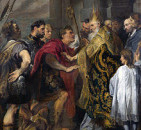Theodosius I also known as Theodosius the Great, was Roman Emperor from 379 to 395. Theodosius was the last emperor to rule over both the eastern and the western halves of the Roman Empire. His social transformation was a pivotal, if under-recognized, milestone in European history; it parted with Roman religious tolerance and political strength and may be seen in retrospect as the inauguration of a feudal society. On accepting his elevation, he campaigned against Goths and other barbarians who had invaded the Empire; he failed to kill, expel, or entirely subjugate them, and after the Gothic War they established a homeland south of the Danube, in Illyricum, within the empire's borders. He fought two destructive civil wars, in which he defeated the usurpers Magnus Maximus and Eugenius at great cost to the power of the Empire.
He also issued decrees that effectively made Nicene Christianity the official state church of the Roman Empire, and he neither prevented nor punished the destruction of prominent Hellenistic temples of classical antiquity, including the Temple of Apollo in Delphi, the Serapeum in Alexandria.
He dissolved the order of the Vestal Virgins in Rome. In 393, he banned the pagan rituals of the Olympics in Ancient Greece. It was not until the end of the 19th century, in 1896, that Olympics were held again. After his death, Theodosius' incapable sons Arcadius and Honorius inherited the East and West halves respectively, and the Roman Empire was never again re-united.
- Parte del discurso: proper noun
- Industria/ámbito: Historia
- Categoría: Historia europea
Other terms in this blossary
Creador
- KSGRAM
- 100% positive feedback
(Athens, Greece)





